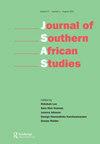Editorial
IF 0.9
4区 社会学
Q2 AREA STUDIES
引用次数: 0
Abstract
The relationship between agency, resistance and power remains central to academic and political debates on the position and role of Africans and Africa on the local and global stage. In recent years, historical and contemporary analyses have devoted great attention to this complex relationship. This emerging scholarship has become more attentive to the necessity for more nuanced analysis of the ways in which African citizens, their leaders and their institutions contribute, and have contributed in the past, to wider socio-economic and political transformations at both local and global level. By focusing on both individual and institutional agency, the first four articles in this issue offer finely grained accounts of the relationship between agency, resistance, and power in different southern African countries. In South Africa, the history of the consolidation of colonial bureaucratic control and African responses to it continues to be an important entry point to understand the relationship between colonial power and colonial subjects and its contemporary legacies, especially in relation to traditional rule, culture and custom. In the first article in this issue, ‘Faku’s Tusks: Colonialism, Resistance and Accommodation in Early Twentieth Century South Africa’, Denver Webb demonstrates how the colonial government’s attempts to consolidate power through their own interpretation of culture and customary law was countered by Mpondo leader efforts to reassert their authority through their own countervailing arguments on what constituted culture and custom. Webb does this by showing how the leadership of Mpondo in early-20th century-Transkei was punctuated by complex strategies of negotiation, resistance, compromise, acquiescence and assertion of cultural identities. The article admirably shows how the differing approaches to dealing with colonial government and contestations for power within Mpondo society impacted on Mpondo relations with the colonial state. The theme of agency, power and resistance in colonial South Africa is also central to the next paper in this special issue. In the article, ‘“If you belong to my generation and you never read James Hadley Chase, then you are not educated”: Everyday Reading of High School Students in Soweto, 1968–1976’, Kasonde Thomas Mukonde demonstrates the ways in which literature was central to the experience of Soweto’s students and their emergence in the public sphere as political actors. In drawing from extensive interviews with student activists from the 1960s and 1970s, Mukonde underlines how their reading became central to the making of a youth political consciousness in South African schools. This article shows how, despite its repressive nature, Apartheid education unwittingly allowed for the emergence of spaces of subversion and resistance which African students and teachers exploited to their own advantage. Ultimately, as the author poetically concludes, ‘when put to use the imaginations of young people can overcome repression and achieve great things – and can even set in motion the process of overthrowing a powerful oppressive state’. The next two sets of papers continue to explore the role of African agency, resistance, and the complex interweaving of power relations with a particular focus on Malawi. Moving社论
机构、抵抗和权力之间的关系仍然是关于非洲人和非洲在地方和全球舞台上的地位和作用的学术和政治辩论的核心。近年来,历史和当代的分析都对这种复杂的关系给予了极大的关注。这一新兴的学术界越来越关注对非洲公民、他们的领导人及其机构为地方和全球更广泛的社会经济和政治变革做出贡献的方式进行更细致分析的必要性。通过关注个人和机构代理,本期的前四篇文章对不同南部非洲国家的代理、抵抗和权力之间的关系进行了细致的描述。在南非,巩固殖民官僚控制的历史以及非洲对此的反应仍然是理解殖民权力与殖民主体之间的关系及其当代遗产,特别是与传统统治、文化和习俗有关的关系的重要切入点。在本期的第一篇文章《法库的图斯克:二十世纪初南非的殖民主义、抵抗和迁就》中,Denver Webb展示了殖民政府如何通过自己对文化和习惯法的解释来巩固权力,而Mpondo领导人则试图通过自己对什么是文化和习俗的反驳来重申他们的权威。韦布通过展示20世纪初Transkei的Mpondo领导层是如何被谈判、抵抗、妥协、默许和断言文化身份的复杂策略所打断来做到这一点的。这篇文章令人钦佩地展示了处理殖民政府和姆蓬多社会内部权力争夺的不同方法如何影响姆蓬多与殖民国家的关系。殖民地南非的机构、权力和抵抗也是本期特刊下一篇论文的核心。在题为“如果你属于我这一代人,你从未读过詹姆斯·哈德利·蔡斯的书,那么你就没有受过教育”的文章中:《索韦托高中生的日常阅读,1968-1976》,卡松德·托马斯·穆孔德展示了文学是索韦托学生经历的核心,以及他们作为政治行动者在公共领域的出现。穆孔德通过对20世纪60年代和70年代学生活动家的广泛采访,强调了他们的阅读如何成为南非学校培养青年政治意识的核心。这篇文章展示了尽管种族隔离教育具有镇压性质,但它是如何在不知不觉中允许出现颠覆和抵抗的空间的,而非洲学生和教师利用这些空间为自己谋利。最终,正如作者诗意地总结的那样,“当运用年轻人的想象力时,他们可以克服压迫,成就伟大的事业,甚至可以启动推翻强大压迫国家的进程”。接下来的两组文件继续探讨非洲机构、抵抗和权力关系的复杂交织的作用,特别关注马拉维。移动
本文章由计算机程序翻译,如有差异,请以英文原文为准。
求助全文
约1分钟内获得全文
求助全文
来源期刊

Journal of Southern African Studies
AREA STUDIES-
CiteScore
1.40
自引率
0.00%
发文量
73
期刊介绍:
The Journal of Southern African Studies is an international publication for work of high academic quality on issues of interest and concern in the region of Southern Africa. It aims at generating fresh scholarly enquiry and rigorous exposition in the many different disciplines of the social sciences and humanities, and periodically organises and supports conferences to this end, sometimes in the region. It seeks to encourage inter-disciplinary analysis, strong comparative perspectives and research that reflects new theoretical or methodological approaches. An active advisory board and an editor based in the region demonstrate our close ties with scholars there and our commitment to promoting research in the region.
 求助内容:
求助内容: 应助结果提醒方式:
应助结果提醒方式:


